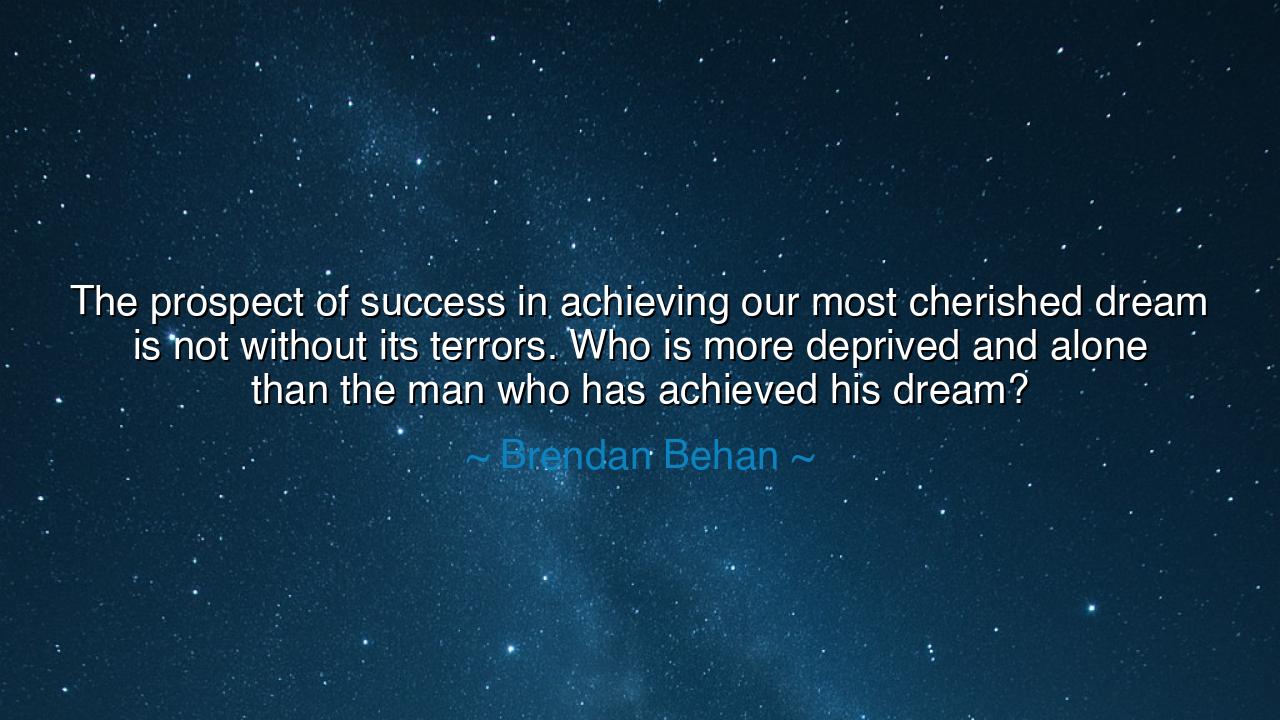
The prospect of success in achieving our most cherished dream is
The prospect of success in achieving our most cherished dream is not without its terrors. Who is more deprived and alone than the man who has achieved his dream?






In the mournful yet profound words of Brendan Behan, the Irish poet and playwright, he declared: “The prospect of success in achieving our most cherished dream is not without its terrors. Who is more deprived and alone than the man who has achieved his dream?” These words, drawn from the depths of a restless soul, reveal one of the greatest paradoxes of human existence — that the fulfillment of desire may lead not to joy, but to emptiness. Behan, who lived fiercely and burned brightly, knew the strange sorrow that comes when a man reaches the summit of his ambition only to find that the view is lonelier than the climb. His words echo through the ages as a warning and a lament: that dreams, once attained, can leave the heart desolate, for they are the shadows of something greater — the eternal hunger of the spirit for meaning.
When Behan speaks of terror in success, he unmasks a truth that many dare not face: that our dreams sustain us not because they are reached, but because they give us something to reach for. The journey itself, with all its struggle, hope, and striving, gives purpose to life. The dream is the star by which the wanderer finds his path through the night. But once that star is reached, what remains? The man who has achieved his dream stands, as Behan says, “deprived and alone”, for the fire that once drove him has gone out. The dream that once lifted him above despair now leaves him standing still, holding a prize that no longer fills the void it once promised to cure.
The origin of these words lies in Behan’s own tragic genius. A man of great talent and wit, he rose from the working streets of Dublin to international fame as a playwright and poet. His early success brought him acclaim, wealth, and recognition — yet it also brought ruin. He found that the world’s applause could not still the ache within him. Success became a burden; fame, a form of exile. Like many artists before and after him, Behan discovered that the dream fulfilled is the beginning of another kind of suffering: the loss of purpose, the absence of striving, the silence that follows the song. His life, though brilliant, was cut short by excess and sorrow — a testament to his own haunting truth.
History is filled with echoes of Behan’s lament. Consider the life of Alexander the Great, who conquered the known world before the age of thirty. When his armies could march no farther, he wept, saying there were no more worlds left to conquer. In that moment, he stood not as a god among men, but as a man stripped bare — deprived, as Behan said, by his own triumph. The crown that once gleamed with glory became heavy with emptiness. For Alexander, as for Behan, success had revealed a terrible secret: that the victory of the flesh does not satisfy the hunger of the soul.
This truth does not condemn ambition, but sanctifies yearning. For it is in the pursuit, not the possession, that man finds life’s meaning. The dream is a teacher, not a treasure; it awakens courage, shapes character, and draws the spirit toward greatness. But once attained, the wise must learn to let go and seek a new horizon — another dream, higher still, born not of vanity but of growth. The tragedy lies not in achievement, but in mistaking achievement for completion. The soul that ceases to dream begins to die.
Behan’s words also speak of loneliness — the solitude of those who have climbed too far beyond the company of others. The man who achieves his dream often discovers that he has outpaced those who once shared his journey. His triumph isolates him, for few can understand the cost of the crown. The dream that once connected him to humanity may now set him apart from it. Yet in that solitude lies an invitation: to turn inward, to seek companionship not in praise, but in peace; not in recognition, but in renewal.
Let this be the lesson: do not live for the dream alone, but for the becoming that the dream demands. Pursue your vision with passion, but hold it lightly, for it is the path that sanctifies, not the prize. When you achieve one dream, be grateful — then look to the next horizon. Feed not on success, but on purpose; rest not in glory, but in growth. For the man who keeps his soul awake with wonder, who always seeks a new beginning, shall never be truly alone.
Thus, the wisdom of Brendan Behan stands as both elegy and exhortation: that man must dream, but never mistake the dream for the end of dreaming. The summit, once reached, is not the resting place, but the beginning of another climb — the eternal ascent of the spirit toward the infinite. For only he who continues to strive, even in success, keeps alive the sacred fire that makes life worth living.






AAdministratorAdministrator
Welcome, honored guests. Please leave a comment, we will respond soon